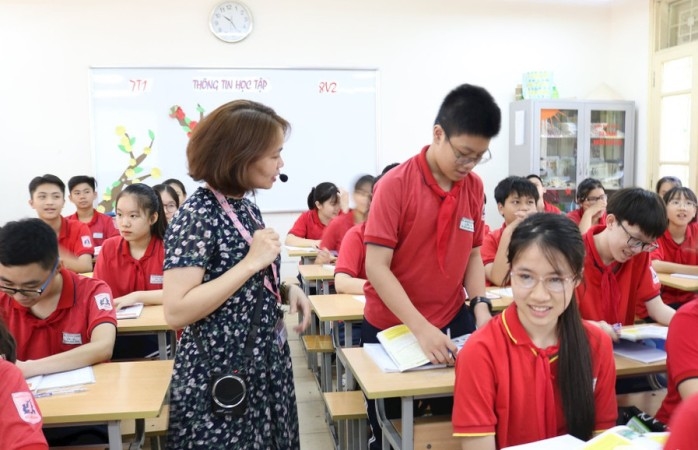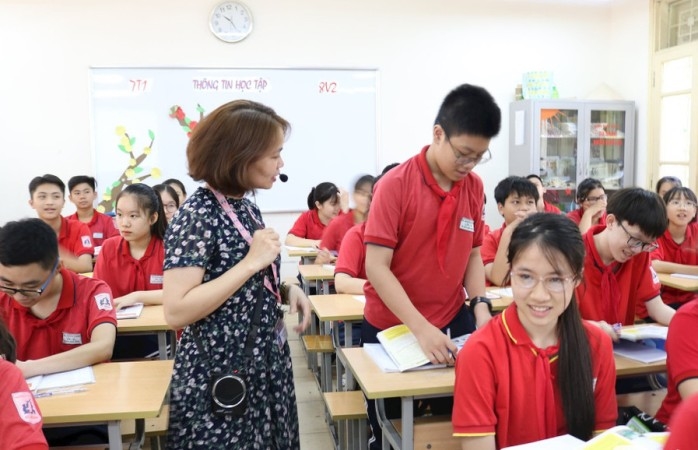
Conclusion No. 91-KT/TW of the Politburo sets out a breakthrough task in teaching and learning English with the key content: "Focus on improving foreign language proficiency of students, gradually making English the second language in schools...". The plan of tasks and key solutions for the 2024-2025 school year of the Education sector also sets out the requirement: "Research and develop projects and plans to gradually make English the second language in schools".

It is undeniable that in recent years, teaching and learning English has received increasing attention not only from educational institutions but also from students and parents, who are aware that this language will become a tool in the future, not just a subject. However, making English a second language in schools also poses many difficulties and challenges.
Commenting on the current situation of teaching and learning English in schools, experts said that although the position of the subject has been significantly increased with a great change, English in particular and foreign languages in general are still "low points" for the majority of students in localities, especially mountainous and ethnic areas.
The results of the English exam in recent high school graduation exams show that although the average score has improved, it is still the subject with the highest number of students scoring below average compared to other subjects, especially with a large differentiation by region and province. While in large provinces and cities, learning English and taking foreign language certificates has become a booming movement, in remote areas there is still a lack of teachers, lack of facilities and students have not had access to new teaching methods.
Along with the problem of lack of teachers, students' awareness is also an obstacle in teaching and learning foreign languages. In fact, many students' English learning is still heavily focused on scores and studying for exams. Students can get high scores in grammar but are not confident in communicating as a second language.
Therefore, many experts believe that in order to make English the second language in schools, there needs to be a certain roadmap, including completing the legal basis, along with specific projects, focusing on improving both the quantity and quality of the teaching staff.
According to Prof. Dr. Tran Van Nhung, former Deputy Minister of Education and Training, making English the second language in schools is a big and difficult problem, especially in rural, remote and isolated areas where living, studying and working conditions are still lacking. However, with the participation of the entire political system, in which the Government, the Ministry of Education and Training, and relevant ministries and branches are responsible for developing detailed plans on programs, textbooks, exams, mechanisms, policies, etc., it can be done. In addition, attention must also be paid to the needs and aspirations of students and parents in disadvantaged areas.
"We propose that the Ministry of Education and Training and experts consider maximizing the use of international English programs and textbooks for Vietnam, and cooperate to invite more overseas Vietnamese teachers and teachers from other countries," Professor, Dr. Tran Van Nhung proposed.
Prof. Dr. Tran Van Nhung said that language is a tool for teaching and learning, daily life, communication and work. Therefore, making English a second language must be realized and closely linked to improving knowledge and employment for the young generation and workers. At the same time, it is necessary to pilot to expand the teaching of natural sciences in English, followed by social sciences.
According to Associate Professor Dr. Tran Kiem Minh - Head of the Mathematics Department, University of Education (Hue University), the first important condition to make English the second language in schools is the policy and support of the State. Accordingly, the State needs to institutionalize with legal policies towards the above goal, along with support in terms of resources. At the same time, it is necessary to ensure the number of qualified English teachers and teachers teaching specialized subjects in English. There are appropriate programs, textbooks, and learning materials. In the immediate future, for Math and Natural Sciences, it is necessary to have bilingual learning materials and promote the teaching of these subjects in English in schools.
Along with that is the learning environment, policies to encourage and motivate, promote cultural exchange with English-speaking countries for international integration among young people. In particular, the Government needs to have a long-term, clear policy, roadmap, with strategic milestones to implement goals and ensure sustainable development.
Associate Professor, Dr. Tran Kiem Minh shared: Since 2012, the Faculty of Mathematics - Hue University of Education (Hue University) has implemented a bachelor's program in mathematics teaching in English. The Faculty is the pioneer in the country in training teachers to teach mathematics in English. After 12 years of implementation, many graduates have been teaching mathematics in English at high-quality schools, international schools, and bilingual schools across the country.
The most useful experience that Associate Professor Dr. Tran Kiem Minh has learned so far is the spirit of determination to implement with the motto "keep going and you will get there". "We have implemented it gradually, implementing subjects that can be taught in English first, then gradually expanding the number. Up to now, we have taught all specialized subjects in the training program in English", Associate Professor Dr. Tran Kiem Minh expressed.
As an English teacher, Ms. Thu Ha (An Tao Secondary School, Hung Yen City) shared that to improve the quality of English teaching, the most important thing is to develop expertise, train core teachers by proactively participating in training courses, seminars and distance learning to update new teaching methods, improve personal skills and be ready to share experiences, coordinate with colleagues to improve teaching methods with intuitive, lively, attractive lectures, suitable for students and local and school conditions. Change the assessment method to focus on skills instead of just focusing on language knowledge so that students can see the effectiveness of the program, the most basic of which is to listen and speak English according to their ability.
Along with that is building an environment, an English learning movement associated with educational activities in schools, encouraging children to learn English from a young age, building a love of language and helping them understand the benefits of using English, so that students do not feel "afraid" of English. These are the things needed to create a breakthrough in the professional work of teaching and learning English.
From a business perspective, talking about the importance of foreign languages, recently at a conference of the Government Standing Committee with large enterprises, Vingroup Chairman Pham Nhat Vuong also proposed that the Government popularize English not only in public schools but also for all people, towards a global citizen society. At the same time, he said that Vingroup and businesses are willing to sponsor teachers to go to remote areas. "Promoting English training from remote areas to urban areas will create a better "fishing rod" for children, contributing to the development of these difficult places in the future," he added.
Some experts also believe that, along with preparing a full legal framework, it is necessary to strengthen the socialization of education, have preferential policies to attract teachers, and remove difficulties for public schools when recruiting foreign teachers. This is also an inevitable trend when Vietnam is integrating more and more deeply into the world./.

Contact
Please enter your information to this form
Hotline